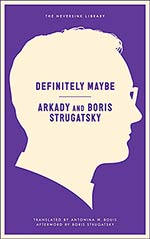
![]() thrak
thrak
4/25/2015
![]()
"Well then, buddy, how do you expect to explain fantastic events without a fantastic hypothesis?"
Dmitri Malianov is on the verge of a major breakthrough, a discovery that will recontextualise the entire field of astrophysics, Nobel prize winning stuff. So he's sent his wife and kid away so he can concentrate. Unfortunately poor Dmitri can't get a break. First a delivery arrives with crates of vodka and caviar, then a ludicrously attractive woman turns up in a short skirt. And when he still refuses to be put off his work, that's when the government heavies turn up threatening him. Speaking to his friends, he finds out that they too have been on the verge of great discoveries in their own quite disparate fields before becoming similarly distracted. Someone, or perhaps something, really doesn't want them to make these discoveries.
In 'Definitely Maybe' the Strugatsky brothers examine what happens when the human spirit is faced with an immovable force that cannot be reasoned with. It is a chilling work of intense paranoia, made all the more powerful for being rooted in the Strugatskies' real life experiences writing science fiction in soviet Russia, where they frequently faced censorship. In the afterword Boris Strugatsky explains the difficulty they faced at every turn publishing this very book itself. There is an undercurrent of bitterness and frustration evident in 'Definitely Maybe' that gives its satirical humour a real bite.
The Strugatskies are masters of tight plotting. Despite its short length, 'Definitely Maybe' is perfectly formed. The creeping sense of inescapable dread is expertly built up, culminating in a pile up of unlikely reveals, each designed only to further obfuscate and misdirect the protagonist. While he and his friends desperately try to come up with some plausible explanation to explain their circumstance, poor Dmitri is constantly having the rug pulled from under him. The explanation of a jealous supercivilisation determined to stop humanity from developing to a level where it could compete with them only makes sense to these characters because they are clutching at straws, hoping against all available sense and evidence that they are up against something that can be understood or reasoned with. Dmitri's learned friend Vecherovsky comes up with the theory that it is not another civilisation bringing humanity's brightest and best minds to a screeching halt, it is a natural force that exists to limit the extent to which a civilisation can progress. This idea is rather more interesting than the concept of malicious alien intelligence precisely because a force of nature is something physical and absolute that cannot be argued or reasoned with, like gravity. It's a potent metaphor for the force that cannot be grappled with, because it both appeals to our sense of knowledge and science, in that there are natural limits on any animal population which of course includes human, as well as invoking an almost Lovecraftian horror of a vast and indifferent cosmos next to which we will always be insignificant.
But what 'Definitely Maybe' is really interested in is how people react in the face of such a force. The Strugatsky brothers write knowing full well that everyone has their price. If a force you cannot fight offers you everything you could possibly want with one hand and threatens to annihilate you and everyone you care about with the other, what choice do you have? Is it possible for a person still to have integrity in a system where the cards are so comprehensively stacked against you? These are the big questions 'Definitely Maybe' wrestles with. Dmitri sees his friends reduced to spineless cowards who, while they have everything they desire, will never achieve anything with their lives. However, because he has a wife and child and would be putting them in danger otherwise, he too capitulates and gives up his life's work and his shot at greatness. However, his friend Vecherovsky, who has no family ties, takes it on himself to collect Dmitri's and all the others' work so that he can work on it and preserve it for future generations to work on. The story ends on a hopeful note, albeit ambiguously. Humanity can still struggle on against such forces, because concepts such as science and the truth are important.
http://goldenapplesofthewest.blogspot.co.uk/2014/04/arkady-and-boris-strugatsky-definitely.html